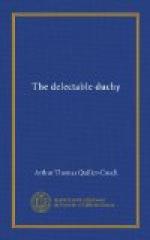It was unusual, though, to see Long Oliver driving a horse and trap; and Geake, moreover, had a sudden notion.
“Good-mornin’,” he answered; “whither bound?”
“St. Austell. I’ve a bit of business to do, so I’m takin’ a holiday; in style, as you see.”
“I wonder now,” Geake suggested, forgetting all about the coffin, “if you’d give me a lift. I was just thinkin’ this moment that I’d a bit o’ business there that had clean slipped my mind this week.”
This was transparently false to any one acquainted with Geake’s methodical habits. Long Oliver screwed up his eyes.
“Can’t, I’m afraid. I’m engaged to take up old Missus Oke an’ her niece at Tippet’s corner; an’ the niece’s box. The gal’s goin’ in to St. Austell, into service. So there’s no room. But if there’s any little message I can take—”
“When’ll you be back?”
“Somewhere’s about five I’ll be passin’.”
“Would ‘ee mind waitin’ a moment? I’ve a cheque I want cashed at Climo and Hodges for a biggish sum: but you’m a man I can trust to bring back the money safe.”
“Sutt’nly,” said Long Oliver.
Geake went into the house and wrote a short letter to the bankers. He asked them to send back by messenger, and in return for cheque enclosed, the sum of twenty-five pounds, in five new five-pound notes. He was aware (he said) that the balance of his running account was but a pound or two: but as they held something over fifty pounds of his on deposit, he felt sure they would oblige him and enable him to meet a sudden call.
“Twenty-five pounds is the sum,” he explained; “an’ you must be sure to get it in five-pound notes—new five-pound notes. You’ll not forget that?” He closed the envelope and handed it up to Long Oliver, who buttoned it in his breast-pocket.
“You shall have it, Mr. Geake, by five o’clock this evenin’,” said he, giving the reins a shake on the mare’s back; “so ’long!” and he rattled off.
A mile, and a trifle more, beyond Geake’s cottage, he came in sight of a man clad in blue sailor’s cloth, trudging briskly ahead. Long Oliver’s lips shaped themselves as if to whistle; but he made no sound until he overtook the pedestrian, when he pulled up, looked round in the man’s face, and said—
“Abe Bricknell!”




